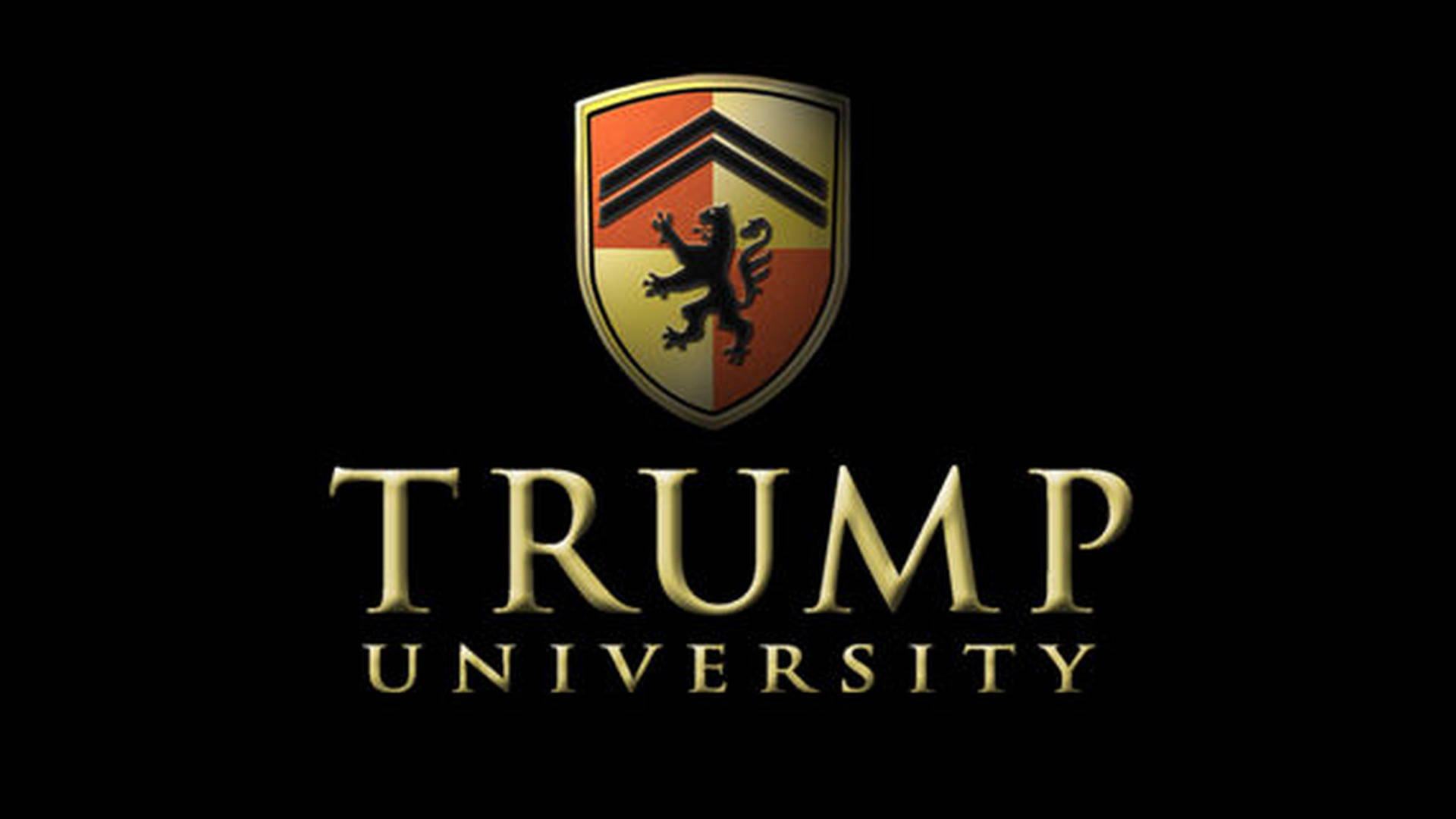
Updated by Libby Nelson on June 1, 2016, 2:00 p.m. ET @libbyanelson
Trump University didn’t even pretend its goal was to offer students an education. Internal documents show that it was a scam, with the sole goal of getting its students to sign up for more classes.
Documents released Tuesday night, which Donald Trump fought to keep secret, show how recruiters were instructed to upsell potential “students” to a $35,000 mentorship, whether they could afford it or not.
Even for-profit colleges offer college degrees and expect students to do something to earn them. Trump University had nothing to do with higher education — it was a series of get-rich-quick investment seminars with two goals. One was to identify prospects with the money to spend on Trump’s seminars. The other was to get them to spend as much of it as possible.
The first seminar was free. The second, which was three days long, cost $1,500. The crown jewel was the year-long partnership with an adviser hand-picked by Donald Trump, an experience that cost $35,000. Even after they paid tens of thousands of dollars, students would be pushed to buy even more products.
The new trove of documents shows how they went about those sales, with hard-sell tactics that played on people’s hopes for a better future. Recruiters were trained in the art of the high-pressure scam and were told to toy with their prospects’ emotions and urge them to run up their credit cards.
Then Trump University didn’t deliver on its promises. “To my knowledge, not a single consumer who paid for a Trump University seminar program went on to successfully invest in real estate based upon the techniques that were taught,” Ronald Schnackenberg, a former sales manager for Trump University, said in a depositionunsealed on Tuesday.
Jason Nicholas, a former sales executive whose testimony was also unsealed, was even more blunt: “The Trump University instructors and mentors were a joke. … It was a façade, a total lie.”
How Trump University was like a timeshare scam
The most important documents unsealed at the behest of Judge Gonzalo Curiel, the federal judge overseeing a class-action lawsuit against Trump University, were hundreds of pages of “playbooks” for Trump University marketers, which show in ugly detail how the scam sucked in customers.
Trump University’s only pretense at being a part of real higher education was the name. Colleges have admissions officers with a higher education background, not salespeople trained to get you to agree with them and hand over your money. If you enroll for a bachelor’s degree at a real university, you’re not told that what you really need is a PhD that costs almost 30 times as much.
In the playbook, on the other hand, the people at the Trump seminars are referred to as “buyers,” “attendees,” “clients,” or “prospects” — not “students.”
Recruiters were ready to be manipulative, and the playbooks include plenty of information on the psychology of sales:
/cdn0.vox-cdn.com/uploads/chorus_asset/file/6575723/Screen%20Shot%202016-05-31%20at%205.10.19%20PM.png)
The playbooks are filled with strategies for flattering potential customers, such as saying “I noticed” to indicate that they stand out from a crowd, or saying “congratulations” rather than “thank you.” One page lists “the most persuasive words in the English language”: “You, New, Money, Easy, Discovery, Free, Results, Save, Proven, Guarantee, and Love.”
It also tells them what to do if members of the media show up: “Once reporters are present it no longer matters why they are there.”
/cdn0.vox-cdn.com/uploads/chorus_asset/file/6577215/Screen%20Shot%202016-05-31%20at%204.48.30%20PM.png)
Recruiters are also told what they can’t say — under no circumstances were they to make guarantees or verifiable promises about what, exactly, students could achieve with a Trump University education. Those could be fact-checked and land the business in legal trouble.
/cdn0.vox-cdn.com/uploads/chorus_asset/file/6577177/Screen%20Shot%202016-05-31%20at%205.11.16%20PM.png)
And Trump University did not want legal trouble. The playbook cautions students that if a state or district attorney shows up, they don’t have to show them anything without a warrant — but “you are expected to be courteous.”
Trump University’s perfect student
While a “university” usually cares about students’ academic background, Trump University only cared about their bank accounts. Clients provided financial information, and recruiters used that to sort prospects into categories. People with at least $35,000 in liquid assets were on top.
The chief prospects for Trump University, according to the playbook, were middle class or wealthier — well-educated, in their 40s or 50s, making at least $90,000 per year, worth at least $200,000, and living in a single-family home with a man as the head of the household. They should be married with children. They should give to charity. They should be “early adopters of the internet and currently heavy users.”
But not all students fit that profile. Schnackenberg said it “preyed on the elderly and uneducated in order to separate them from their money.” One of the class-action lawsuits pending against Trump University deals with retirees, not 50-year-old middle managers.
If the students objected, the playbook was ready with counterarguments. The playbook emphasizes that salespeople aren’t supposed to listen to prospective clients’ excuses or take “no” for an answer. Just reading it feels like sitting down with someone intent on giving you the hard sell.
If they wanted to consult a spouse, they should be urged to sign up anyway — you can always cancel!
If they protested that it was too much money, recruiters were supposed to say, “Most people look at this and are so excited it’s only that amount with everything we include,” and then push them to charge the $35,000 on a credit card and pay only the interest, with eventual real estate riches taking care of the principal.
And if students said they planned to take what they’d already learned at the cheaper seminars and try it on their own, they would be told in no uncertain terms that was a bad idea:
How are you going to locate the properties? How are you determining ARV? All cash offer? Where is your financing coming from? How will you negotiate price?… The risk isn’t spending $35K — it’s entering into the world of REAL ESTATE without specialized knowledge, guidance, and trained professionals in the field holding your hands. WE are the safe decision. Fear is preventing you from investing in yourself. I find it very difficult to believe that you’ll invest in anything else if you don’t believe enough to invest in yourself and your education.
In other words, after the free 90-minute seminar and the $1,500 retreat, Trump University salespeople would admit their product was essentially useless. But the real secrets were still out there, they’d say, if people wanted to pay $35,000 to get them.
Even those who’d paid $35,000 weren’t safe from sales tactics. “The whole purpose of the $35,000 elite seminars was to get people to buy additional books, seminars, and products,” Schackenberg said in his testimony.
Donald Trump’s big mistake: calling Trump University a “university”
Trump’s scam wasn’t even original. Another financial seminar, Rich Dad Poor Dad, has asimilar business model: Get people in the door with a free seminar, then keep upselling them to the most expensive version, which cost thousands of dollars.
And unlike Trump University, Rich Dad Poor Dad is still in business. It’s not necessarily illegal to separate gullible people from their money — just unethical. But while Trump University cautioned its representatives to make no guarantees, the company’s very specific boasts are what eventually got it into trouble:
- Trump University promised that Trump “handpicked” the instructors, even though investigations from the New York attorney general found that the curriculum mostly came from a company that specializes in high-pressure sales environments, such as timeshare seminars.
- Trump named his seminar business a “university” — a prestigious word with, unfortunately for Trump, a very specific meaning. This eventually got him into trouble with New York regulators, and he changed the name to the Trump Entrepreneur Initiative.
- Trump promised “professors and adjunct professors” — more words borrowed from academia. Instead, according to the unsealed testimony, Trump University hired instructors who’d lied about their credentials or had no background in real estate at all.
And the promises, Nicholas said in his testimony, were “a bunch of baloney.”
“You were on your own,” he said. “The mentor didn’t take you through deals step by step, you didn’t have the skills or knowledge to do it, and — after paying $35,000 for the course — you didn’t have the finances to invest either.”

